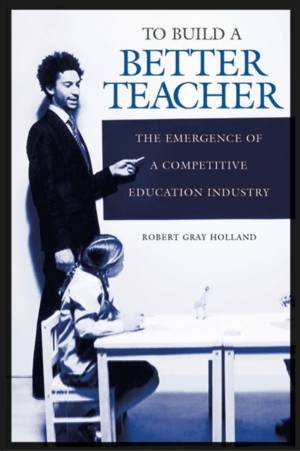
- Afhalen na 1 uur in een winkel met voorraad
- Gratis thuislevering in België vanaf € 30
- Ruim aanbod met 7 miljoen producten
- Afhalen na 1 uur in een winkel met voorraad
- Gratis thuislevering in België vanaf € 30
- Ruim aanbod met 7 miljoen producten
Zoeken
To Build a Better Teacher
The Emergence of a Competitive Education Industry
Robert Holland
Hardcover | Engels
€ 60,45
+ 120 punten
Omschrijving
Throughout the 20th century, grade-school teachers were trained in schools of education where progressive theories largely held sway and were licensed by state bureaucracies philosophically compatible with the education schools. Vested education interests now seek to make the monopoly even more controlling by requiring that all teachers be products of education schools accredited by a single national agency dedicated to progressive ideals.
Holland proposes an alternative vision compatible with the emerging 21st-century paradigm of a competitive education industry: Lower unnecessary barriers to teaching so that bright persons of diverse background and disposition can become teachers. Set up an alternative track--as in New Jersey--so that bright liberal arts graduates or persons with valuable real-world experience can be hired as teachers and put under the supervision of experienced mentors. Apply value-added assessment--as in Tennessee--to these new teachers, and to veteran teachers as well, so that principals can see how much each teacher has helped each child progress academically--or not--from school year to school year. Holland's plan to break up the teacher-prep monopoly is bound to be controversial, and, as such, should be of great interest to all--from parents and administrators to teachers and policy makers--concerned with improving the state of American education.Specificaties
Betrokkenen
- Auteur(s):
- Uitgeverij:
Inhoud
- Aantal bladzijden:
- 168
- Taal:
- Engels
Eigenschappen
- Productcode (EAN):
- 9780897898850
- Verschijningsdatum:
- 30/09/2003
- Uitvoering:
- Hardcover
- Formaat:
- Genaaid
- Afmetingen:
- 158 mm x 243 mm
- Gewicht:
- 367 g

Alleen bij Standaard Boekhandel
+ 120 punten op je klantenkaart van Standaard Boekhandel
Beoordelingen
We publiceren alleen reviews die voldoen aan de voorwaarden voor reviews. Bekijk onze voorwaarden voor reviews.











